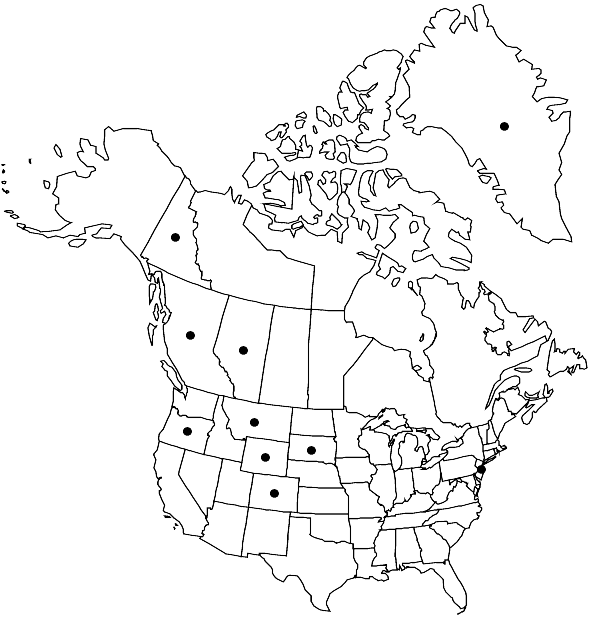Grimmia elatior
Mem. Reale Accad. Sci. Torino 40: 340. 1838,.
Plants in robust, dark green to blackish green, loose, hoary, readily disintegrating tufts. Stems 1–5 cm, central strand absent. Leaves loosely appressed to slightly twisted when dry, erectopatent when moist, lanceolate to ovatelanceolate, tapering to acute apex, 2–3.0 × 0.5–0.7 mm, keeled, margin broadly recurved on one side, awns short to long and weakly denticulate, costa weak at base, channeled distally, projecting on abaxial side; basal juxtacostal laminal cells short to long-rectangular, sinuose-nodulose, thick-walled; basal marginal laminal cells quadrate to short-rectangular, thin to thick-walled; medial laminal cells quadrate to short-rectangular, sinuose, thick-walled; distal laminal cells 2-stratose with thick, prominent multistratose bands, margins multistratose and thick, areolation very opaque with rounded thick-walled cells, occasionally papillose. Gemmae absent. Sexual condition dioicous. Seta arcuate, 2–3 mm. Capsule occasionally present, emergent to exserted, brown, obloid, striate, exothecial cells thin-walled, annulus present, operculum rostrate, peristome teeth purple, deeply split, papillose. Calyptra mitrate.
Habitat: Exposed, dry acidic rock and occasionally basic limestone
Elevation: moderate to high elevations (500-4500 m)
Distribution

Greenland, Alta., B.C., Yukon, Colo., Mont., N.J., Oreg., S.Dak., Wyo., Eurasia, Africa
Discussion
Grimmia elatior is fairly common in the Canadian Rockies and in the western United States. It is predominantly bound to the Rocky Mountain area in Colorado, Wyoming, and Montana. In eastern North America it is known only from a site in New Jersey. It can be recognized easily by its robust habit, usually growing in dark green, extended patches on various types of acidic rock, like gneiss, granite, and sandstone. While it is often described as having papillae, most North American specimens do not have them. E. M. Mair (2002) reported that papillae were strongly expressed in harsh conditions but many specimens from the alpine in both the Yukon and Colorado lack papillae. The widespread but uncommon western species G. leibergii is commonly mistaken for G. elatior. However, the former has both leaf margins recurved, its lamina is 1-stratose with only 2-stratose margins, and its basal juxtacostal cells are elongate to linear; in G. elatior there is only one recurved leaf margin, its lamina is 2-stratose with multistratose bands and margins, and its basal juxtacostal cells are only short- to long-rectangular. The length of the awn in G. elatior is quite variable; plants with nearly muticous leaves and plants with very long awns may be found growing close together. There is also some resemblance to G. pilifera, widespread in Asia and eastern North America. The latter, however, has immersed capsules, both margins are recurved, and its lamina does not have multistratose bands.
Selected References
None.